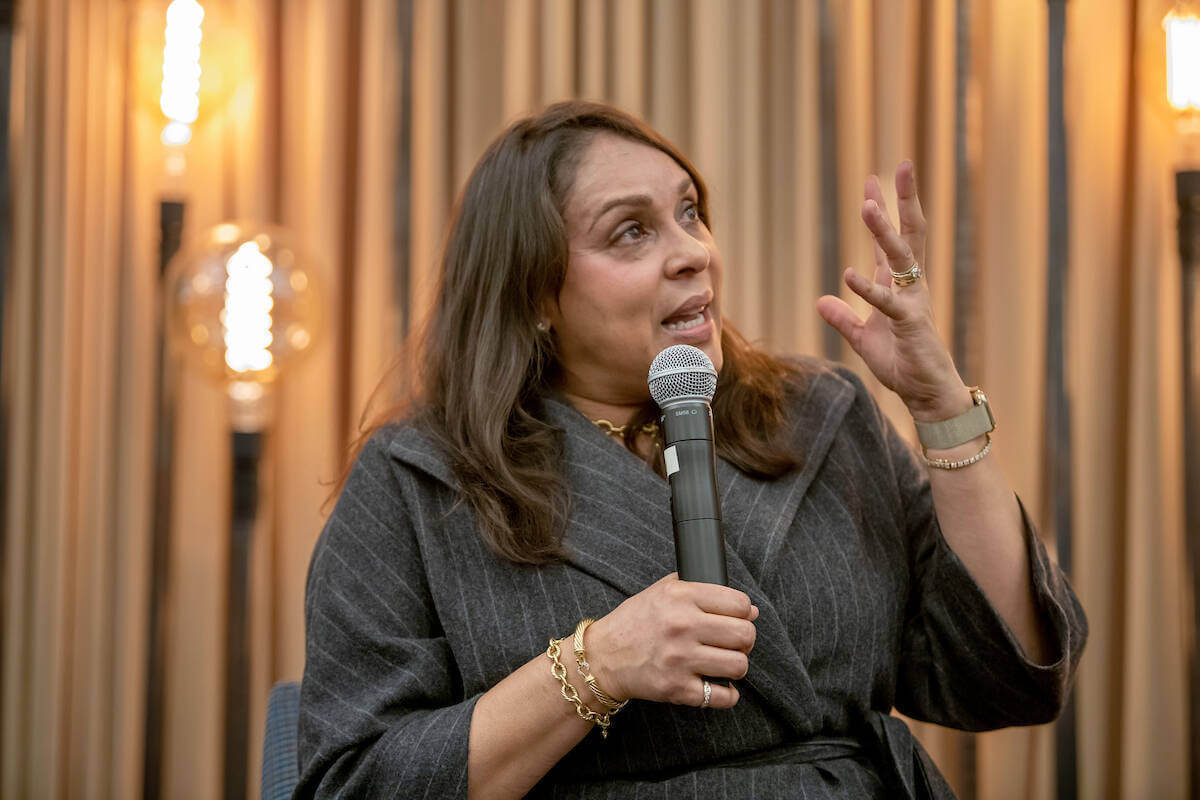
For poet Natasha Trethewey, the need to make meaning from the geography of her past is not unlike the ancients looking to the night stars and drawing connections between them.
“The constellations they named inscribing a network of stories that gave order and meaning to their lives. That’s one of the reasons I write. I needed it to create the narrative of my life, its abiding metaphors, so that my story would not be determined for me,” said Trethewey, a Pulitzer Prize-winning poet and former national poet laureate, during a January 19 presentation on campus.
Her visit was a keynote gathering for this year’s Walk the Walk Week, which continues through January 27 with campus events and discussions intended to encourage reflection about diversity and inclusion.
Trethewey gave a lyrical talk about her life and work, titled “Why I Write.” She described her 1966 birth and early childhood in Gulfport, Mississippi, the daughter of a Black mother and a white father who married in Ohio because interracial marriage was still illegal in Mississippi and many other states.
Trethewey is an artist-in-residence this year with Notre Dame’s Initiative on Race and Resilience.
She is the author of the nonfiction book Memorial Drive: A Daughter’s Memoir (2020); Beyond Katrina: A Meditation on the Mississippi Gulf Coast and five collections of poetry. She won the 2007 Pulitzer Prize in Poetry for her collection Native Guard and served as Poet Laureate of the United States from 2012-2014. She is now the Board of Trustees Professor of English at Northwestern University.
In 2017 Trethewey earned the Heinz Award for Arts and Humanities, and in 2020, she received the Rebekah Johnson Bobbitt National Prize for Lifetime Achievement in Poetry from the Library of Congress.
Following are selections from Trethewey’s presentation.
About the first poem she ever wrote:
“It could be said that part of my journey as a poet began with Dr. (Martin Luther) King. When I was only in the third grade, I wrote my first poem, an elegy for him, and his message of social justice has continued to guide me.”
How books figure in some of her earliest memories:
“The first collection of books I ever encountered filled the shelves of the tall bookcase at the back of my grandmother’s house. It stood just inside the doorway to the den at the end of a long hallway. From floor to ceiling was an assortment of novels and plays, philosophy, history and mythology from my parents’ university years. A set of classic children’s stories in several volumes, etiquette books, a group of pamphlets from the ’50s about the proper dress and comportment of young ladies, an abridged dictionary and the 26-volume World Book (Encyclopedia) 1966. Bought for the year I was born, the set was meant to be commemorative, marking the beginning of my journey toward knowledge. My grandmother had purchased the set after nearly a year of saving the S & H Green Stamps she received with each purchase at the grocery store.”

How childhood walks with her father, a poet and English professor, sparked her love of words:
“He was determined that I have an early understanding of the metaphorical nature of language. During the day, the natural world served as our classroom. Most afternoons we took long walks during which I picked wildflowers for my mother and he would recite poetry. All along the way, he’d point out the flora and fauna we encountered, the vivid imagery inscribed in so many of the names: red-winged blackbird, with its bright slash of feathers. Mockingbird, mimicking another bird’s song. The word daisy, which he repeated again and again, altering it just so until I heard in the syllables of that single word two distinct ones: day’s eye.”
How watching as a child the work of her grandmother, a drapery seamstress, inspires her work today:
“To create that seamless blend of form, she made precise measures and cuts so that no material was wasted, nothing was out of place, the patterns true, the result a thing of beauty. That translates to me now as a way to think about syntax, about order and chaos. How one writes is inseparable from why one does.”
The poet’s parents divorced when she was young. Her mother remarried and the family lived in Atlanta. In 1985, Trethewey’s mother was murdered by her ex-husband, Trethewey’s former stepfather, a troubled man with a history of domestic violence:
“That I have come to be a writer in the aftermath of my mother’s death still wounds me. She nurtured the very thing that could engender my survival in that house, despite what it meant for hers. Losing my mother hurt me into poetry. I write to answer her life with mine, to honor her memory by creating a monument in words.”
Trethewey told the audience she plans to expand her “Why I Write” lecture and publish it as a book.
“The act of writing is a way to create a world in language, a dwelling place for the psyche wherein the chaos of the external world is transformed, shaped into a made thing and ordered. It is an act of reclamation and resistance.”
Margaret Fosmoe is an associate editor of this magazine. She can be reached at mfosmoe@nd.edu or @mfosmoe.